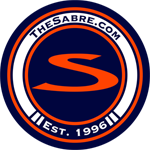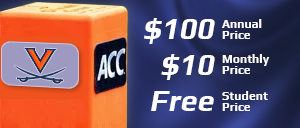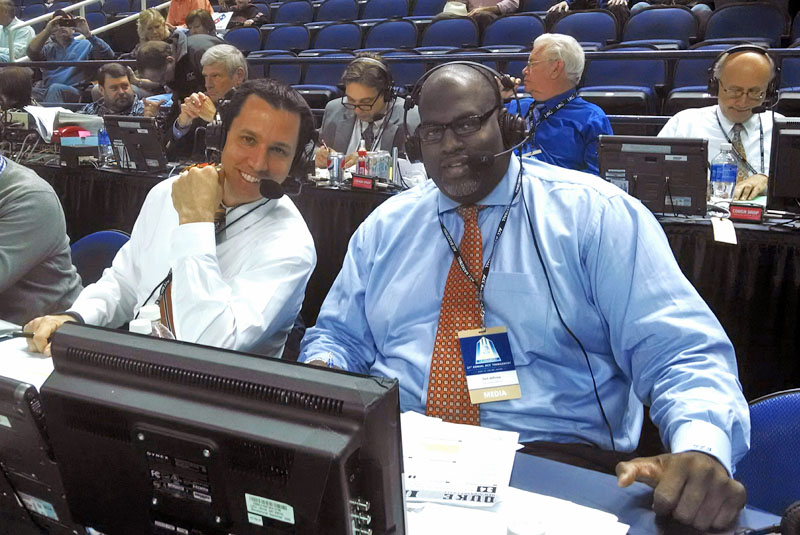
Ted Jeffries is currently the color analyst for the Virginia Sports Network. Alongside play by play man Dave Koehn, Jeffries can be heard during every UVa men’s basketball game offering insight or breaking down what’s happening on the court. Jeffries joined the radio broadcast team during the 2011-12 season after Cory Alexander left to work with as a television color analyst for the ACC Network. Jeffries graduated from UVa with a degree in Rhetoric and Communication, so he’s come full circle, so to speak.
While Jeffries is continually honing his skills as a radio personality, he is probably best known for his contributions as a Virginia basketball player. Jeffries played from 1990 through 1993 and started 127 of the 129 games he played. In his four years, the 6’9″ center scored 821 points and pulled down 787 rebounds. He had the opportunity to play for coach Terry Holland as a freshman and was under the guidance of coach Jeff Jones his remaining three years.
Jeffries was a co-captain as a senior during the 1992-93 season, averaging 10 points and eight rebounds per game while making 52 percent of his field goal attempts. Jeffries participated in three NCAA Tournaments. As a junior in 1992, Jeffries and his teammates helped senior Bryant Stith win the National Invitational Tournament. The following year his team reached the Sweet 16.
Jeffries played alongside a number of UVa’s most memorable players, including the aforementioned Stith and Alexander, John Crotty, Matt Blundin, Terry Kirby, Jason Williford, Junior Burrough, and Cornel Parker. He keeps up with many of them still today.
Immediately following his college basketball career, Jeffries played professional basketball overseas in Asia, Europe, and South America before returning to the U.S. to coach with Coastal Carolina and William & Mary as an assistant. Prior to working with the Virginia Sports Network, Jeffries worked as an assistant director with the Virginia Athletics Foundation.
Jeffries played his high school ball under coaching legend Morgan Wooten at DeMatha in Washington, D.C., and then followed up with a prep year at Fork Union before heading to Virginia.
The Sabre Interview
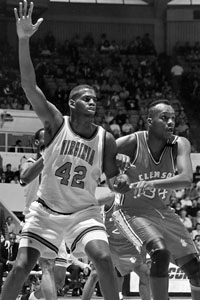
 Mike: Have you been surprised by the success of the 2013-14 team considering they were still relatively young?
Mike: Have you been surprised by the success of the 2013-14 team considering they were still relatively young?
JEFFRIES: No, I don’t think I was really surprised by their success. I think there were great expectations surrounding this team this year. I will admit that I don’t think I saw them being ACC Tournament Champions or a No. 1 seed – therein would be my surprise. But, as the season went on you could see how that became a possibility. Did I see them exceeding expectations as a No. 4 seed in the preseason rankings? … Yes. I thought that they would be better than that. I didn’t see them losing only two games in the conference. I don’t think anybody predicted that.
 Mike: How well did you think UVa could do this season in terms of conference play and overall season?
Mike: How well did you think UVa could do this season in terms of conference play and overall season?
JEFFRIES: With Tony [Bennett], since his inception here at UVa, his teams have always exceeded expectations. This year I anticipated they would continue to follow along the same trend and be better than what they were expected to be.
 Mike: Can you remember Virginia ever having a team with so much talent and depth on the bench?
Mike: Can you remember Virginia ever having a team with so much talent and depth on the bench?
JEFFRIES: Hmm. That’s a good question. I can’t say that I have. I’ve seen teams with talent. I would harken back to Cory Alexander’s and Junior Burrough’s class. You look the talent our first year, a very talented group. That ’95 class where there was success there. Those are talented bunches. I didn’t really follow Virginia back in the early 80’s, when you talk about Ralph [Sampson] and his bunch.
 Mike: You mentioned Cory’s and Junior’s class. Are you talking about the year they were freshmen and won the NIT, along with Yuri Barnes, Jason Williford, and Chris Alexander? That provided a solid bench with an excellent starting group.
Mike: You mentioned Cory’s and Junior’s class. Are you talking about the year they were freshmen and won the NIT, along with Yuri Barnes, Jason Williford, and Chris Alexander? That provided a solid bench with an excellent starting group.
JEFFRIES: The starting five was Anthony Oliver, Bryant Stith, Cory Alexander, Junior Burrough and myself. Backing us up; Yuri Barnes, Shawn Wilson, Chris Havlicek, Doug Smith … Cornel Parker was there. That’s a relatively deep team. Then you go to ’95 with [Curtis] Staples, [Harold] Deane, Jamal Robinson … I believe Norman Nolan was on that team. Those two teams were fairly deep. But obviously as deep as they may have been with the talent, they didn’t have the same success that this team has. A lot of that has to do with the quality of the league and the quality of play that this team has exhibited this year.
 Mike: A lot of hype surrounded this year’s team early on, but they struggled in out of conference play. How much of this do you think had to do with each player understanding his own particular role and how much was Bennett learning what lineups and rotations work best in a given situation?
Mike: A lot of hype surrounded this year’s team early on, but they struggled in out of conference play. How much of this do you think had to do with each player understanding his own particular role and how much was Bennett learning what lineups and rotations work best in a given situation?
JEFFRIES: I think it was a healthy smattering of both. You’re not really sure about everything as a staff when you get a chance to look at your team. It’s going to take some gelling. You’ve got Malcolm Brogdon coming back from injury … Anthony Gill was eligible this year … trying to see where they fit in. Darion [Atkins], Mike Tobey … those guys, just finding out where they were coming out of the summer. It took a little while for them to try and figure out … you know, we know the struggles that Anthony Gill had defensively early on in the non-conference season. He admitted it on a postgame interview. I asked him, ‘What’s it going to take for you to stay on the court?’ [He said], ‘It’s going to take me playing better defense.’ So, understanding that this team hangs their hat on defense as a staple of their program, it’s going to take those guys a minute to figure it out – to figure out how to play together. You’ve got a lot of talent out there and a lot of personalities. You want guys hungry for minutes for playing time, but none of them are given – they’re all earned.
I think it was probably 60/40, with sixty being trying to figure out these guys, who they are, what their roles are … and then the coaching staff, having to do their job executing the game plan, figuring out who are the guys they can count on, and how do you motivate the guys who may be getting caught up in the numbers game. I think the best example of that is Evan Nolte in this NCAA Tournament, and how much he has been able to contribute by just staying ready. Darion Atkins, in the latter part of the conference schedule – giving solid minutes and participating well defensively, offensively, and giving them that lift. These guys have been able to buy into that. There are still some frustrations, but just not enough minutes right now.
 Mike: This is Bennett’s first full team of only “his” players. Prior, we had several of Dave Leitao’s players perform very well under Bennett (Jerome Meyinsse, Assane Sene, Mike Scott, Jontel Evans, e.g.) and others transfer. As a player who bridged the Holland and Jones changeover, what are some of the challenges such a player might experience in “bridging the gap” between coaches?
Mike: This is Bennett’s first full team of only “his” players. Prior, we had several of Dave Leitao’s players perform very well under Bennett (Jerome Meyinsse, Assane Sene, Mike Scott, Jontel Evans, e.g.) and others transfer. As a player who bridged the Holland and Jones changeover, what are some of the challenges such a player might experience in “bridging the gap” between coaches?
JEFFRIES: Different coaching styles. I remember back when Terry [Holland] retired and Jeff [Jones] took over the helm, Virginia was very similar to the way Coach Bennett coaches – as a halfcourt team. They weren’t much for trying to play fastbreak basketball or getting out and running the ball [under Holland]. They were more a halfcourt, possession program. Jeff wanted to change the tempo, and I think he could do that based upon the recruiting class he had coming in. And if you remember correctly, the cupboard was not left bare. He saw some opportunities for Virginia to pick up the pace a little bit offensively.
Those are some of the challenges; coaching style, and the personalities, also. If you’re not a particular coach’s guy – if you weren’t the one that he recruited and spent time with – you may not be in the same plan for his program as the previous coach. So there could be a rub there. Those are the two things that stand out. Outside of that, I think it’s really just about the game of basketball.
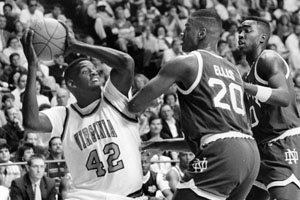
 Mike: Do you remember your playing days at UVa, or is it all a blur?
Mike: Do you remember your playing days at UVa, or is it all a blur?
JEFFRIES: I remember a lot more than I don’t remember. It’s fun talking to a lot of my former teammates. They remember something that happened in a game or practice that I might not recall. I remember quite a bit. I remember opportunities to get to the Big Dance. For us, we felt like it was expected that we were going to be there. We thought that our team was good enough, and sure, we had to battle like crazy to get there. But in our minds we were an NCAA Tournament team every year. And with the exception of my third year, we were. Three out of four years I was at UVa, we did make it to the Big Dance. Expectations were set high from the first day of preseason practice.
 Mike: Talk about your development as a player. What were the contributing factors: players, coaches, drills, etc.?
Mike: Talk about your development as a player. What were the contributing factors: players, coaches, drills, etc.?
JEFFRIES: [The ACC was] a lot more physical league back then and you were allow to put a little more contact on guys crossing through the paint. Terry Holland set the foundation for me – to prepare me for the rigors of ACC play. He would see me in the hallway at U-Hall, and every time he’d walk past me he’d run and slam his shoulder into me and say, emphatically, “He’s not coming in here.” He was continually reminding me that this is a physical game, a lot more physical than high school and a lot more physical than Fork Union prep school – and just me preparing my mind. I never forgot that.
You know, Jeff Jones during my first year, talking to me about, ‘You’ve developed a jump hook and I think that is your go-to move, and you really need to spend some time in the summer shooting about a hundred of those a day from both sides of the block, shooting left and right-handed.’ You know, spending real quality time on perfecting that jump hook. And I did. I spent a lot of summers and a lot of early mornings and late nights working on that jump hook.
Marc Iavaroni, one summer right before my third year – we did a lot of one-on-one work for the long part of the summer while I was going to summer school and trying to stay ahead of the game. Came out to work out three, four, or five times a week – as much as his schedule would allow. We spent some quality minutes working on my job shot … read, react … drills … when do you shoot, when do you put it on the deck – one dribble pull up … when you go all the way to the lane … mixing up inside-outside play.
Those are the guys I remember, just making sure they impart what they’ve learned – their knowledge and their skill sets – and trying to share it with me. It was a big summer. It was a lot of hard work. I wanted to get better. I wanted to be the best player I could be. I wanted to compete at this level since before I was in high school. I’d run on the field while the football team was going through preseason practice. … John Gamble, getting in the weight room and working on speed and agility drills, trying to get quicker and faster. Weight has always been an issue for me, so I was doing the best I could to make sure I was always in the best shape. I might not have always looked the part, but any one of our coaches could count on me to give them forty minutes.
I always put in the hard work. I’d like to think, and by your own admission, Mike, that I was a much better player by my fourth year than I was when I came in.
 Mike: Doug Smith once called you ‘the luckiest player in ACC history’ when you were able to start as a first-year due to Brent Dabbs being academically suspended. Do you think it would have been better for you to be a back up for a year or two before starting? Or did starting early help with your development?
Mike: Doug Smith once called you ‘the luckiest player in ACC history’ when you were able to start as a first-year due to Brent Dabbs being academically suspended. Do you think it would have been better for you to be a back up for a year or two before starting? Or did starting early help with your development?
JEFFRIES: Well, had I not gone to prep school and come right into UVa, that would have been the year I would probably had been redshirted because Brent Dabbs played quite a bit. And we always had Curtis Williams, another transfer in. Having gone to Fork Union for a year, that was actually my ‘redshirt year’ in my opinion. But I got a chance to play, show responsibility, and be counted on as a go-to player on that team [FUMA]. So by the time I got to UVa I saw the opportunity when Brent Dabbs was not going to be there. I knew it was between me, Jeff Daniel and Shawn Wilson. And in my mind I felt like I was better than both of those guys. It was only going to be my effort that was going to be able to prove that.
For me starting as a first year, whether it be by luck or hard work, I lend myself to the latter rather than the former. It was best for me to get out there, you know, trial by fire – hands on experience.
 Mike: What made playing here special for you? What were the best moments or memories that made it worthwhile?
Mike: What made playing here special for you? What were the best moments or memories that made it worthwhile?
JEFFRIES: I think it all comes down to the guys who you lace them up with every day in practice, the friendships you develop, and most importantly, winning. We won a lot more than we lost, that’s for sure. The experiences and battles that we had, those are the things you always remember. Those are the things you can always fall back on, smile, and remember. People even now, for a long time even before Tony Bennett, people will ask, ‘When did you play, Ted?’ I would say, ‘Late 80’s, early 90’s.’ And they’d say, ‘Those were the good old days.’ That’s always good to hear.
It was a good time for Virginia basketball. We were yearly ranked in the Top 25. We competed like crazy. We won a lot of big games. We lost some tough ones. And postseason play. The year that we didn’t get to the Big Dance, we went to the NIT and won it all. That was special, to send Bryant [Stith] and Anthony [Oliver] – who meant so much to this program – out with a championship.
Those are the things that really make my playing days special. And not just my teammates – coaches, when you talk about faculty and staff, people who have gone on to great things. Ethan Saliba, who I credit as being one of the best trainers not only in Virginia history, but in this sport. His knowledge and his commitment to this program is unprecedented. Jeff Jones, a great coach who has gone on to have success after UVa. Terry Holland – all of these guys. … Tom Perrin, who’s gotten out of coaching, but he’s been very successful in his endeavors. The guys that we had around us – staff, trainer John Gamble – what an incredible career he’s had with so many different coaches at Miami – just a great strength and conditioning coach, but also being a mentor and motivator.
So many different guys. Craig Littlepage, let’s not forget him. He’s been a mentor. I’m a big fan with what he’s done and the overall success of UVa’s athletic program. It’s just been a great, great experience being around UVa. It’s part of the reason I’m back.
 Mike: What has been the biggest surprise or adjustment for you with the radio gig?
Mike: What has been the biggest surprise or adjustment for you with the radio gig?
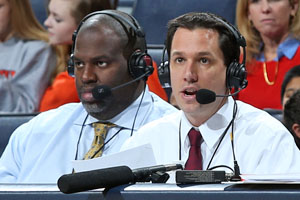
JEFFRIES: Well, you never really know all that it takes to be on the radio and be successful at it. Very much like my [college basketball] career, kind of being thrown into it without much experience prior to joining a radio staff. I think I’ve continued to try and get better, try to hone in on my craft, try to be entertaining and informative, and just understanding that the nuances of radio are tough. Basketball is a lot different than football. I’ve talked with Tony Covington, who does football. Both are challenging in their own way, but basketball is a lot quicker game and the timing of it has to be something that you work on. I’m a lot better now than I was before, but I still feel like there’s a long way for me to go. I want to make sure I continue to improve and work on it – asking better questions, being more concise, being more informative, and really try to explain why things happen on the court to give the listening audience a true understanding. Like my playing career here, I continue to strive to get better.
 Mike: What’s your relationship with Dave Koehn outside of your radio responsibilities?
Mike: What’s your relationship with Dave Koehn outside of your radio responsibilities?
JEFFRIES: Dave Koehn and I have a lot of fun. I have a huge amount of respect for Dave and the job that he does. He loves his job and I appreciate that. I can see how he meticulously approaches the prep work that he has to do to make sure he is being informative and giving great tidbits of information. Now, as my friend I will also say that he talks a whole lot. I say that jokingly because he is my friend. I think because we’ve built a friendship outside of radio, it helps with what we do on the radio. I’m hopeful that I can continue to work with a guy like Dave and be to be a part of this Virginia basketball family, as long as they will have me.
 Mike: College basketball has continued to evolve. What do you like most and least about the game now versus 15 to 20 years ago?
Mike: College basketball has continued to evolve. What do you like most and least about the game now versus 15 to 20 years ago?
JEFFRIES: I’ll start with what I like least. They’ve made basketball a soft game, because they’ve taken away the physicality of the game – the hands off kind of play. They’ve made it tough for guys to battle in the post. Those are the things that made me a tough guy in the league, to play a tough brand of basketball, and understanding how physical it was going to be.
I think back to a lot of the guys I had to guard – Elden Campbell (Clemson), Dale Davis (Clemson), Scott Williams (UNC), Tony Massenburg (Maryland), Jerrod Mustaf (Maryland), Derrick Hicks for Wake Forest, Malcolm Mackey (GT), Rodney Rogers (Wake), Christian Laettner (Duke), Cherokee Parks (Duke), Alonzo Mourning of Georgetown. That’s a great lineup of guys. This is a physical game, and I tried to be a physical player. That’s what I appreciate about the game. If it ain’t rough, it ain’t me. I don’t want to be in it if it ain’t rough. It’s trial by fire. You get in there and you battle. It’s tougher now. It’s a little bit softer inside. They protect guys. They take away the physicality of the game. I don’t like that part of it. I think you can be physical without being nasty. There’s a fine line, like there’s a fine line between arrogance and confidence.
From a positive standpoint … the free flow of the game now. You see more points going up. It’s funny, I haven’t thought about how some of the changes have been positive [laughs]. Being a nostalgia guy, I just live in the area where the game has changed and I prefer it to be the way it was. I guess, conversely, the free flow around the perimeter allows guys to do a little bit more. I guess the scoring has gone up. That’s not necessarily the case for UVa because they’re a slow it down, grind it out program. Overall, basketball has changed in that regard.
 Mike: There has been discussion on reducing the time on the shot clock. What are your thoughts on that?
Mike: There has been discussion on reducing the time on the shot clock. What are your thoughts on that?
JEFFRIES: Seeing that there is a complete difference between the NBA and college – you’re talking about 24-second shot clock versus 35-second shot clock – that would make it more of a prep league for the next level, making guys more prepared and shortening the time. The game moves a little faster and you don’t have a whole lot of time for … if they’re talking about pressing you and you’ve got to get it over and get a shot up, you don’t have time to grind it out. I would welcome the opportunity to experiment with it for at least a year or two, to see if it’s something we can get used to and what it does for the game.
 Mike: If they were to lower the time, what do you think would be a good starting point?
Mike: If they were to lower the time, what do you think would be a good starting point?
JEFFRIES: I would say 30. Take five seconds off and see what it does. I would suggest that rather than going down to a 24-second shot clock.
 Mike: How would the changes of the last 20 years have affected you as a player?
Mike: How would the changes of the last 20 years have affected you as a player?
JEFFRIES: You have to adapt. I think I was a smart enough player … you learn the roles, you learn what you can and can’t do … you always have to be proactive getting post players off the sweet spot … whatever you can do without using your hands. You just have to learn to adapt. It wouldn’t have bothered me much. [Coming into UVa] I had to learn to become more of a physical player. The challenge might have been that if you were going into your third year as a very physical inside post player, and then they change the rules. Early on in the non-conference schedule [this past season], you could see how guys were picking up early fouls, especially playing on the perimeter. Even in the post with the arm bar and all of that. You adapt quickly. You want to stay on the court and the smart ones can. That’s what keeps you out of foul trouble. I don’t think it would have been much of a challenge for me. I was smart enough player to make the adjustments one way, I’m sure I could have done it another.
 Mike: Do you keep up with any of your teammates from your playing days?
Mike: Do you keep up with any of your teammates from your playing days?
JEFFRIES: Absolutely. Periodically I will talk to a lot of my guys. Obviously I see Cory [Alexander] because he comes to a lot of the games. And Doug Smith, my co-captain. Once a year I’ll talk to Shawn Wilson. Junior Burrough is here in the D.C. area. I’ll check in with my man Cornel Parker down in the Norfolk area – very proud of him. He got his master’s degree, he’s a father of two, and back in his area he’s done a lot of great things. [Editor’s note: Read a Catching Up With Cornel Parker article here.] I see Anthony Oliver. My roommates in college were Chris Slade and Terry Kirby – ironically I lived with two football players; Terry for three years and then Chris joined us my third year. So I’ll talk to those guys periodically. A lot is more texting nowadays in this new age of technology. Shawn Moore is one of my good friends.
That was the great thing about being at athlete at UVa. Some schools are just sports specific. My friendships go across, not only sports, but with non-athletes as well. I’ll talk to them just as much. Your relationships aren’t relegated to being a former basketball player. There are [many] people I have great memories and experiences and friendships with over my time there in Charlottesville.
 Mike: You were part of UVa’s NIT Championship team with Bryant Stith and the freshmen group that included Cory Alexander and Junior Burrough. Talk a little about the shaved head look, and how did that come about for the tournament? Did you shave your head? Did Coach Jones shave his, as promised?
Mike: You were part of UVa’s NIT Championship team with Bryant Stith and the freshmen group that included Cory Alexander and Junior Burrough. Talk a little about the shaved head look, and how did that come about for the tournament? Did you shave your head? Did Coach Jones shave his, as promised?

JEFFRIES: I’ve got to go back and look at the pictures, Mike. But I remember, if the story holds true … Cory I think was the one who initiated it. There was a conversation when we didn’t make the NCAA Tournament. I remember standing in the portal at U-Hall and Coach Jones asked us if we wanted to play [in the NIT]. We thought it was only fitting to make sure that we did everything we could to continue playing for Bryant and Anthony. So we went and we said, ‘Look, if we’re going to go do this, let’s go win the whole thing.’ And we went up to Villanova and won the game. I believe it was right after that game, we confirmed it. We said, ‘Alright, we’re all in. We got this first one under our belts.’ And in the hotel room guys started shaving their heads. I know Bryant wasn’t going to do his [laughs] – he wasn’t going to do it. Jason Williford was the worst because his scalp looks like a like a Shar Pei puppy. He’s got those meaty rolls of skin, so you could never get all of the hair out. It looked like a pack of hot dogs on top of his head.
Again Mike, I’d have to look at that picture. You’re talking about two weeks. So if I had a high top fade in that picture, then ‘no’ I didn’t shave mine.
 Mike: Well, that’s understandable. Not everybody can make bald look pretty, like me.
Mike: Well, that’s understandable. Not everybody can make bald look pretty, like me.
JEFFRIES: Yeah, well. It takes a special dome and a certain amount of confidence to rock it now. By default I’ve had to do that now, and I look much better without hair than with.
 Mike: Didn’t Coach Jones offer up shaving his head if you guys won it all?
Mike: Didn’t Coach Jones offer up shaving his head if you guys won it all?
JEFFRIES: I believe Jeff did. I remember Terry Holland got a buzz cut. He and Matt Blundin did, so I don’t want to confuse the two stories. I remember shaving T.H.’s head at the end of his last year. But I believe J.J. did get a buzz cut. He didn’t shave it bald, but he went ‘down’ to a really close buzz cut.
 Mike: How does UVa get a recruiting foothold in the D.C. area? Does Maryland leaving the ACC help the effort?
Mike: How does UVa get a recruiting foothold in the D.C. area? Does Maryland leaving the ACC help the effort?
JEFFRIES: I think a lot of it has to do with the success of the program. A lot of these kids like the bells and whistles. And obviously, when you come on Grounds at UVa and step foot in John Paul Jones Arena – you’d be hard pressed to find many arenas that outshine that facility. You talk about Coach Bennett and his staff – character being a priority. And their character is above reproach … the fact that they are now ACC Regular Season and Tournament Champions and No. 1 seed in the [NCAA] Tournament … 30-win season. You know, that only helps to draw [interest]. And it’s a fun style of basketball. It’s not ‘flying around the gym, run and gun’ fun. But it’s ‘winning’ fun. It’s earning the respect of your peers. I think that’s encouraging.
But with regard to the D.C. area? You know, it’s always been tough. Georgetown, in my opinion, rules the roost just because they have so much history, going back to John Thompson. Although they’re under a new administration now, they still have the history. Maryland going to the Big Ten, I think will hurt them quite a bit because this is ACC country and always has been. So they might take a hit for a little while. I mean, they’ve taken a hit since the days of Gary Williams having great recruiters like Dave Dickerson, who’s now at Ohio State. And Jimmy Patsos who I think is still at Loyola-Baltimore [Editor’s note: Patsos became Sienna’s head coach in 2013]. Those great recruiters used to get the job done. They haven’t had the same type of recruiting success [since].
Virginia now has an opportunity. I know Coach Williford has a good foothold with Team Takeover and D.C. Assault and trying to get some of those players. Virginia is a unique institution. You’ve got to get guys who not only have good playing ability and skills, they’ve got to be able to have it between the ears from a basketball standpoint and also what they’re able to do in the classroom. And that’s not always the case here in the D.C. area. My alma mater (DeMatha) – I’m always going to shout them out – Virginia has had success with those guys. And the DC Catholic League, the WCAC … even stretching it out to Baltimore. WCAC might be the best private school league on the east coast. I think the WCAC, when you look at the talent that has come out of there over the years and is still continuing to be generated out of that league, Virginia can do a lot with the talented guys that are coming out of there. They just have to make sure it’s the right fit. And I know Tony’s a big ‘chemistry’ guy.
 Mike: How did you know The Clam was pregnant and not just overweight?
Mike: How did you know The Clam was pregnant and not just overweight?
JEFFRIES: [laughing] The very simple answer is, ‘I didn’t’.
 Mike: Talk about London Perrantes a bit. Some have said he has the potential to be the best pure point guard since John Crotty. Do you see similarities in their game?
Mike: Talk about London Perrantes a bit. Some have said he has the potential to be the best pure point guard since John Crotty. Do you see similarities in their game?
JEFFRIES: Um … I do. You know, John Crotty was always a confident point guard. There wasn’t a whole lot of flash to his game. What I think he perfected was a very quick crossover. He would change direction, change speed. London has a little bit more flash in his game than John, in that regard. He can draw a few more ooh’s and ahh’s when he has the ball in his hands. Both of those guys … rarely shaken, rarely startled, never really look out of control, know how to find guys and get them open, very unselfish … John didn’t need encouragement to shoot the ball, that’s for sure. But he was also a very good shooter.
London, being young, you can see it now that he’s freed himself up. We had always hoped that it would get to the days when he was free as he felt in high school, being a prolific shooter out in California. He seemingly has found his rhythm. His ability to limit turnovers and have a certain amount of assists while leading this team, in my opinion he’s been the real reason for their success. You can point to so many things, but he’s a big part of it. If you take Malcolm Brogdon away, you could probably find other guys to score. I don’t want to take anything away from Malcolm and what he’s done … but if Joe’s not scoring you’ve seen where other guys have stepped up this year. But, fortunately for this team that haven’t had to [play without] London in the starting role since the non-conference schedule.
Mike, I’ve been most impressed by the fact that … you know, when you watch these guys huddle up at the beginning of the game, London is usually the guy who’s speaking. He’s usually the guy who’s leading the conversation. Willingly the leadership defers to him. That’s inspiring. You see him in practices and how he is challenging the coaches, asking the coaches, ‘I think we need to be freer here … maybe we should tweak this there …’ This guy is watching the game and he’s evaluating what is working well, all the while running the show. I say it on the radio all of the time, I think he’s wise beyond his years. He’s cooler than a polar bear’s toe nail.
 Mike: It seems to me that every minute he’s on the court, every dribble, every moment from him is calculated in terms of what he’s about to do with the ball. It doesn’t seem like there’s a wasted motion with him.
Mike: It seems to me that every minute he’s on the court, every dribble, every moment from him is calculated in terms of what he’s about to do with the ball. It doesn’t seem like there’s a wasted motion with him.
JEFFRIES: Yeah, he’s an efficient guy. He won’t over-dribble, he’s not a quick shot guy, he understands the rhythm, and he can keep quicker guards off of him. Rarely do you see someone pick his pocket. The one area I would say he needs to get better is being an on-the-ball defender. When he continues to develop that and gets stronger, with more playing time? … Whew! He’s going to be something to reckon with.
 Mike: Virginia experimented a bit with more up-tempo and motion styles from Gillen and Leitao before coming full circle back to a coach with a defense-first mentality. What similarities do you see in Bennett compared with Holland, and are there similarities of the two eras of Virginia basketball?
Mike: Virginia experimented a bit with more up-tempo and motion styles from Gillen and Leitao before coming full circle back to a coach with a defense-first mentality. What similarities do you see in Bennett compared with Holland, and are there similarities of the two eras of Virginia basketball?
JEFFRIES: The two similarities I see between [the coaches], and I’ll leave it at that, Coach Holland and Coach Bennett hang their hat on defense. I remember when I was coaching at William & Mary, with Tony Shaver being a Dean Smith disciple as a former player for the Tar Heels … we went down to do a retreat with Coach Smith. And Coach Smith leaned over and said to me, ‘You remember solid defense. You guys played smash mouth defense. Terry had you guys hitting people in the mouth.’ … not literally, but figuratively. That’s very similar to Coach Bennett. They hang their hat on the Pack Line, a lot of ball pressure, and keep your eyes on the lane. It’s a different style of basketball, but definitely defensive-minded between the two.
And then they were halfcourt offensive guys. If there were opportunities to run, obviously – I remember Coach Bennett said that in his press conference when he was hired, ‘If there are opportunities when we can get out and run and take advantage of the numbers in transition, sure I’m all for it.’ But he wants to play sound basketball. He has a plan for this program and he’s building it. Some might argue that the foundation has been set with this year. He knows what he wants and what’s successful. I think Coach Bennett is a high quality guy, great for this institution. I hope he will be revered in the same way that Coach Holland was.
 Mike: If you wrote a book on the fundamentals of basketball, what would be Rule No. 1?
Mike: If you wrote a book on the fundamentals of basketball, what would be Rule No. 1?
JEFFRIES: Good question. I would say that everything that you do, do it with enthusiasm. That would be my first rule.
 Mike: I think Justin Anderson would agree with you on that.
Mike: I think Justin Anderson would agree with you on that.
JEFFRIES: Yeah, no doubt about it.
 Mike: Which is best for the game, the finesse game that we have now or the old game with hand checks and a ‘protect the rim at all costs’ type game? Are we allowing too much freedom to drive?
Mike: Which is best for the game, the finesse game that we have now or the old game with hand checks and a ‘protect the rim at all costs’ type game? Are we allowing too much freedom to drive?
JEFFRIES: You know, I don’t think so. In particular, for this program, the no hands works for a system defense like the Pack Line because it’s not individual match-ups. You have to guard your guy, but you know that you can count on your teammate to be in the gap to help you out and deter the offensive opponent from getting inside. So now it’s about position defense, not using your hands and keeping guys in front, containing.
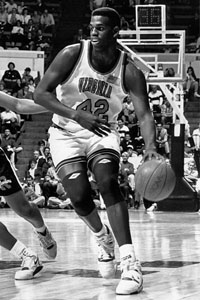
 Mike: How did playing for legendary coaches like Morgan Wooten and Fletcher Arritt help you prepare for the rigors off ACC play?
Mike: How did playing for legendary coaches like Morgan Wooten and Fletcher Arritt help you prepare for the rigors off ACC play?
JEFFRIES: At DeMatha we played the best. We would travel out of town – we’d be at the Beach Ball Classic. Again, the WCAC was one of the toughest conferences. And Coach Wooten just taught the fundamentals of the game, keying in on player development, becoming leaders of men, building us to be solid contributors to society … you know, you play a tough brand of basketball. The reason I think I was able to stay on the court is because I played tough defense in high school … and playing for a defensive minded coach like Terry Holland. If nothing else, if they didn’t need me to score, which I didn’t do a whole lot my first year, I could play defense and I could be in there and battle. What I learned at DeMatha really helped set the foundation.
When I went to Fork Union, it was really about me being able to learn how to be counted on as a go-to player. I didn’t start at DeMatha. I came off the bench as a senior. I played quite a bit and probably played more minutes than the starting forward or center. Getting to Fork Union it was the opposite. Now you’re asked to be the go-to guy, someone they can count on offensively, averaging 16 points and almost eight or nine rebounds. It really helped my confidence on the offensive side as I got ready to come over the hill to Charlottesville. It’s kind of the tale of two sides of the court between those two great, legendary high school and prep school coaches – one more of the defensive side and the other a little bit more edge on the offensive side, but both consistent in everything they taught.

